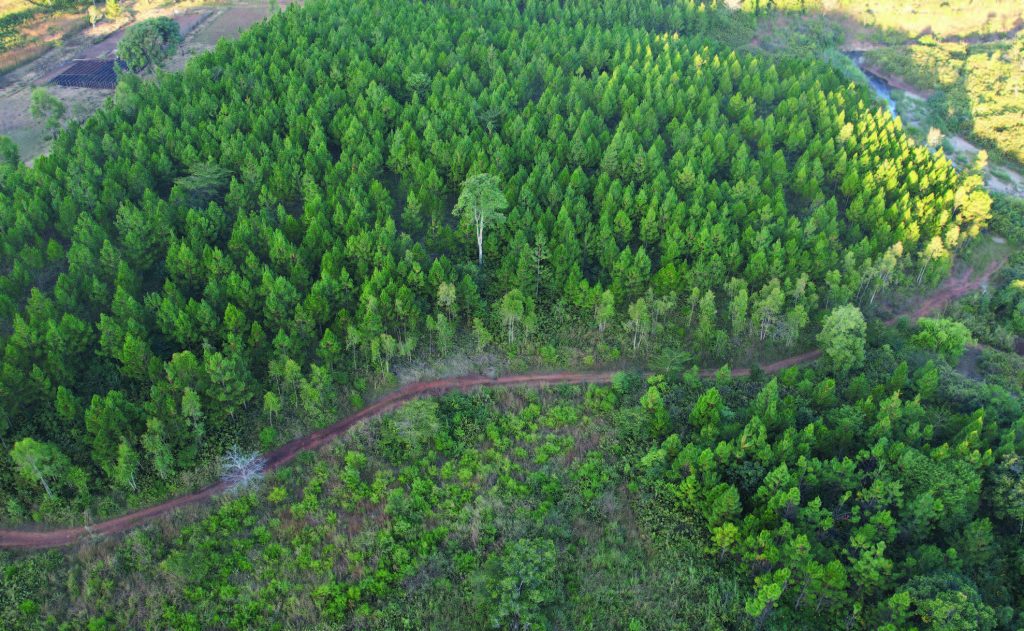Stella Chikhofi’s family of nine in Gochi Village, Ntcheu District, uses firewood and charcoal for cooking.
This is the plight of Malawians without sustainable cooking energy.
A bird’s view of one of the blossoming forests in Ntcheu
“As trees become scarce, we walk long distances to fetch for firewood,” says the 45-year-old.
More than 90 percent of households in Malawi use firewood and charcoal, according to the 2018 census.
The pressure on forests is high in rural areas where 84 percent of Malawians live.
Only five in 100 of them are connected to the on-off national grid.
However, only 1.2 percent of the homesteads connected to the grid use electricity for cooking.
Due to energy poverty, forests are disappearing faster than they are being replenished.
“The rising demand for fuelwood and charcoal in cities hit hard by blackouts and costly electricity bills fuels illegal charcoal business that leaves forests bare,” she says.
Firewood and charcoal are widely seen both on the move and on sale across the country.
“The raid on waning forests is pronounced in Tsangano area,” says village head Shabonga says
As forests disappear, soil erosion increasingly leaves rivers silted and chokes hydropower generation down the Shire River.
The World Food Programme reports that rapid loss of trees increase vulnerability of about 90 percent of Malawian farmers to climatic shocks, rapid population growth and over-dependency on rains.
Dwindling crop yields due to climate change and barren soils compelled Chikhofi to join community efforts to restore degraded landscapes.
“Unfavourable weather conditions, especially unpredictable rainfall pattern, beget chronic hunger,” she says. “Rainwater racing down the bare slopes washes away fertile soils from our fields, leaving them barren.”
The mother of seven harvests just about seven bags of maize from her three-acre plot with the potential to produce 180.
Chester Chambiya of Kavala Village says charcoal business is much ado about nothing.
“You cut many trees to produce a bagful worth K5 000, which cannot buy a 50-kilogramme bag of maize,” he says.
Chambiya and Chikhofi are among 71 farmers planting trees in their degraded forests and crop fields along the Great Shire under the Malawi Watershed Services Improvement Project (Mwasip) funded by the World Bank.
The project seeks to improve the livelihoods and resilience of communities in the catchment of the country’s largest river.
Each farmer received $400 (about K500 000) per hectare to plant trees and care for them.
Thanks to greater understanding of the importance of trees, the area is now draped in pine, eucalyptus gum and indigenous forests.
“We’ve had enough of hunger and poverty made worse by climate change, so we formed forestry by-laws as part of our conservation efforts,” says Shabonga.
Over 290 households now use energy-efficient cookstoves known as Chitetezo Mbaula.
The cookstove halves the firewood and toxic fumes associated with open flames in three-stone fireplaces.
“Since we use less firewood, the frequent long walks in search of firewood have become fewer,” says Chikhofi.
Mwasip promotes agricultural practices that yield more and conserve soil and water amid climate change.
The farmers’ village savings and loan (VSL) circles give them access to soft loans for environment-friendly businesses and lean days.
Emily Mkakato planted 5 000 pine trees on her 2.7 hectares after receiving K757 000 from Mwasip.
She says: “Now I know the long-term benefits of trees. Conserving the environment strengthens our resilience to climate change. We will also benefit from selling timber, logs and wood.”
Chambiya, 48, spent K276 000 on 2 500 eucalyptus trees on his one hectare.
“The trees on the farm constitute long-term wealth for my family. I will extend it to three hectares,” says the father of seven, who expects to earn over K400 million from timber sales.
District forestry assistant Aubrey Palani says Ntcheu plans to replenish forests on 2500 degraded hectares by 2026.
Malawi has pledged to restore over 4.5 million hectares of degraded landscapes by 2030.
“About 24 000 hectares will be done through Mwasip by 2026 in the Shire River catchments in Neno, Zomba, Mangochi, Balaka, Ntcheu, Blantyre and Machinga districts,” says Department of Forestry planning officer Rodgers Tumba
Mwasip technical team member Oswald Mulenga says community-led tree farming business assures the nation of long-term land conservation
 Moni Malawi
Moni Malawi 

